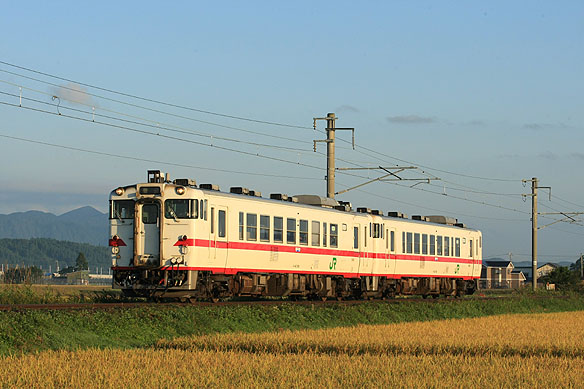Background and overview
In 1977, Japanese National Railways (JNR) developed class kiha40-500 single-car diesel multiple unit (DMU) in order to replace superannuated kiha17 series DMU used on unelectrified lines in cold regions, namely Tohoku and Niigata. At the splitting of JNR into the privatized JR companies, JR East received 92 vehicles of class kiha40-500, and JR Central 2 in 1987.
Car body
Bodies constructed by weatherproof high-tension steel have 20809mm long
and 2930mm wide body having 1.6mm thick skin and 1.2mm thick roof. Their
gangwayed cab ends are constructed with 4.5mm thick plate and employed
raised driver's cab for the protection against obstacles at the level crossing.
Expansible sealing rubber is applied for a gangway door to prevent cold
air from entering through the gap between a gangway door and door frame.
A destination rollsign is fitted above the gangway and two headlights employing
the sealed beam light bulb are fitted at each side of the front rollsign.
They are equipped with two 1,000mm wide stepped single leaf semi-automatic
sliding doors employing the door operating equipment, TK105, fitted above
the door header of the door and double-hung unit assembled windows, the
upper sash of which moves down and the lower moves up, between the doors.
Forced draught ventilators and two FRP water tanks fitted inside the steel
cover are fitted on the roof. They are also equipped with two heat exchangers
rated at 15,000kcal/h under their floor to supply heated air to passenger
room by electric fan. They are also fitted with a cover under the floor
for the protection against snow. Their bodies are painted in vermilion.
Bogies
They are equipped with a powered bogie, DT44, and a trailer bogie, TR227, featuring indirect mounted airbags for the secondary suspension, pedestal type journal supporting system employing rubber covered spring, a large diameter centre pivot, and sealed roller bearings. Brake rigging is the single tread brake powered by the body mounted brake cylinder.
Traction unit and ancillary equipments
Class kiha40-500 vehicles are powered by a diesel prime mover, DMF15HSA, with a power output of 220PS, employing the individual cylinder head and the supercharger, TB15, to achieve higher power output. Their hydraulic transmission gear is DW10, which is made several improvements on DW9 employed for kiha66 series DMU, incorporating oil filling and draining type three-member single-stage torque converter and multi-plate wet clutch. They are equipped with an air compressor, CW750D, powered by a prime mover. Their brake system is the automatic electromagnetic (CLE) air brake.
Accommodation
Seating is arranged as mixture of longitudinal bench seating and 4-seat transverse seating bays with 1470mm seating pitch. Electric fans are fitted under the ceiling. They are vestibuled and equipped with a Japanese style toilet at the end of the vehicles.
Additional delivery
Kiha40 521 onward built in 1979 differ from former class kiha40-500 in
having improved bogies, DT44A/TR227A, substituting cylindrical guide journal
box supporting system for pedestal type journal supporting system. Two
4-seat transverse seating bays were changed into 2-seat transverse seating
caused by enlarged toilet. Thus, their window arrangement is also changed.
94 vehicles were built over the period from 1977 until 1982.
Modification
JR East
JR East began to equip 39 kiha40-500 vehicles with the ticket machines to issue the ticket indicating the boarding station at the doorways, the fare box near the driver's seats, and fare display behind cabs for the conductor-less operation in 1988.
In addition, JR East began to equip three vehicles allocated at Minami-Akita
depot with a self-powered air conditioner, AU34, rated at 26,000kcal/h
in 1995. Likewise, JR East replaced a prime mover with DMF14HZ of Cummins
INC., US and equipped them with two prime mover driven air conditioners,
AU26J-A, rated at 15,500kcal/h in 1996 and onward. As for their accommodation,
JR East began to change the accommodation of 18 kiha40-500 vehicles into
longitudinal bench seating in 1990. Moreover, JR East changed 3 vehicles
of the transverse seating bays into 2+1 abreast.
JR Central
Class kiha40-5500
JR Central equipped a kiha40-500 vehicle with a self-powered air conditioner,
C-AU27, in 1990. In addition, the other kiha40-500 vehicle is equipped
with a self-powered air conditioner, C-AU28, in 1991. Then JR Central replaced
their prime mover with C-DMF14HZB of Cummins INC., US with a power output
of 350PS, and their hydraulic transmission gear with C-DW14A and classified
them into -5500 subclass in 1997 and 1999.
Class kiha40-5800
JR Central equipped a kiha40-5500 vehicle with buttons to open/close doors manually, the ticket machines to issue the ticket indicating the boarding station at the doorways, the fare boxes near the driver's seats and fare displays behind cabs for the conductor-less operation in 1999.
Operations
Class kiha40-500 had been used on rural services on unelectrified lines
in cold regions, Tohoku, and Niigata to name a few. However, they owned
by JR East have completely been withdrawn by replacement with class kiha100
series, kiha110 series, and kihaE130 series excepting special vehicles
used on charters, special events, tourist excursions, and other similar
purposes in 2021. They owned by JR Central have completely been withdrawn
by replacement with class kiha25 in 2016. |
|

